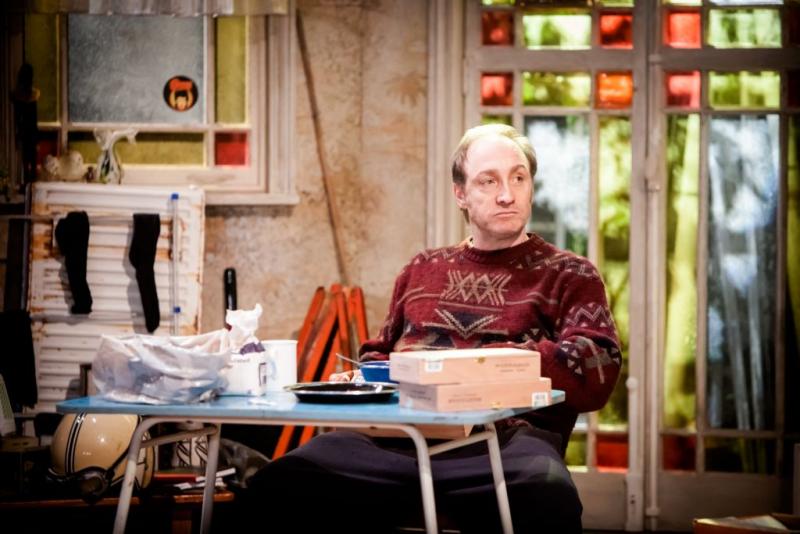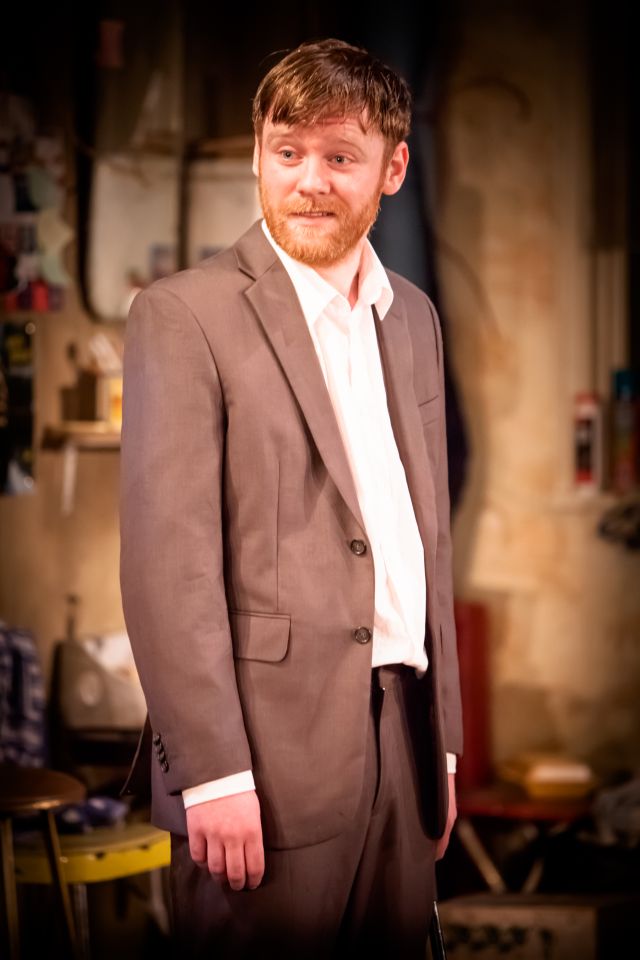The Night Alive, Donmar Warehouse | reviews, news & interviews
The Night Alive, Donmar Warehouse
The Night Alive, Donmar Warehouse
Conor McPherson returns to haunt the London stage afresh

Can theatrical lightning strike twice? That certainly looks to be the case at the Donmar, which has followed Josie Rourke's expert revival of Conor McPherson's contemporary classic, The Weir, with the world premiere of McPherson's latest, directed with a deft finger on both the human and numinous pulse by the author himself.
It's fascinating to note a writer so apparently given over at the start of his career first to the monologue and then the soliloquy here allowing full rein to a dialogue-driven piece that rarely puts an ear, so to speak, wrong. Set in present-day Dublin in the shambolic bedsit of the scarcely less ramshackle Tommy (Ciarán Hinds, pictured below right, with Michael McElhatton at the rear), the play brings together a motley cross-section of life's sometimes quite literally walking wounded, who chart their battered path through the puzzle that we call existence, calling on humour and empathy to ease the way but not without suffering abrasions of both the physical and psychic sort.
 On that very front, Tommy when first seen is offering shelter to the bloodied Aimee (Caoilfhionn Dunne), a young woman whom he rescues from an assault and brings home to a debris-filled room that, it becomes clear, offers refuge numerous times over. Also seeking succour there at regular intervals are Doc (Michael McElhatton, imnmediately winning), the cosmos-minded colleague in Tommy's removals business, and Maurice (the invaluable Jim Norton, winner of both a Tony and an Olivier for McPherson's The Seafarer), Tommy's uncle and patron of sorts, a widower who's not above drunken mid-afternoon ramblings and who perks up most at the prospect of instant coffee. (Maurice's level of awareness is elsewhere tested when he clocks a sack of turnips without paying apparent heed to the dead body lying by its side.)
On that very front, Tommy when first seen is offering shelter to the bloodied Aimee (Caoilfhionn Dunne), a young woman whom he rescues from an assault and brings home to a debris-filled room that, it becomes clear, offers refuge numerous times over. Also seeking succour there at regular intervals are Doc (Michael McElhatton, imnmediately winning), the cosmos-minded colleague in Tommy's removals business, and Maurice (the invaluable Jim Norton, winner of both a Tony and an Olivier for McPherson's The Seafarer), Tommy's uncle and patron of sorts, a widower who's not above drunken mid-afternoon ramblings and who perks up most at the prospect of instant coffee. (Maurice's level of awareness is elsewhere tested when he clocks a sack of turnips without paying apparent heed to the dead body lying by its side.)
As always with this dramatist, people register almost as strongly by their absence, a retinue that on this occasion is surely headed by the family (two teenage children, most notably) from whom Tommy has been all but exiled and by Maurice's much-missed wife, whose anniversary mass, he balefully reports, is attended by a gathering of eight. Audiences are left to puzzle out a final encounter - details not to be revealed here - that would seem to mark a rebirth of sorts, though whether it comes at the price of life itself is up for grabs. (The accompanying music, with lyrics announcing, "Look out Hollywood, here I come", makes mockery of too straightforwardly chipper an interpretation of events.)
 Written as is The Weir for four men and a woman and also played without an interval across close to,two riveting hours, The Night Alive hints at the possibility in the here and now of salvation in the very act of kindness, Maurice's spoken lament for what he calls "sweetness" lingering well after his drink-fueled perceptions have come pouring forth. At the same time, a narrative that springs from an act of charity courses with a degree of violence alien to the earlier play. The tension as often as not is ratcheted up by the camply spoken yet feral Kenneth (Brian Gleeson, son of Brendan and brother of Domhnall), perpetrator of the injuries that led Aimee to Tommy in the first place. (Gleeson is pictured left)
Written as is The Weir for four men and a woman and also played without an interval across close to,two riveting hours, The Night Alive hints at the possibility in the here and now of salvation in the very act of kindness, Maurice's spoken lament for what he calls "sweetness" lingering well after his drink-fueled perceptions have come pouring forth. At the same time, a narrative that springs from an act of charity courses with a degree of violence alien to the earlier play. The tension as often as not is ratcheted up by the camply spoken yet feral Kenneth (Brian Gleeson, son of Brendan and brother of Domhnall), perpetrator of the injuries that led Aimee to Tommy in the first place. (Gleeson is pictured left)
McPherson hits the big issues - death, evil, the workings of black holes - head on, if sometimes a touch self-consciously, while pausing for a non-verbal surrender to ecstasy powered to the music of Marvin Gaye. And as if in response to Doc's remark about "keeping it real, you know", all five actors inhabit Soutra Gilmour's high-ceilinged set as if they had been living these characters for years, Hinds's sad-eyed grace arguably first among equals in a play that stares headlong into the abyss only to ensure that this Night is in every way alive.
- The Night Alive is at the Donmar Warehouse, London WC2, until 27 July
rating
Explore topics
Share this article
Add comment
The future of Arts Journalism
You can stop theartsdesk.com closing!
We urgently need financing to survive. Our fundraising drive has thus far raised £49,000 but we need to reach £100,000 or we will be forced to close. Please contribute here: https://gofund.me/c3f6033d
And if you can forward this information to anyone who might assist, we’d be grateful.

Subscribe to theartsdesk.com
Thank you for continuing to read our work on theartsdesk.com. For unlimited access to every article in its entirety, including our archive of more than 15,000 pieces, we're asking for £5 per month or £40 per year. We feel it's a very good deal, and hope you do too.
To take a subscription now simply click here.
And if you're looking for that extra gift for a friend or family member, why not treat them to a theartsdesk.com gift subscription?
more Theatre
 Faustus in Africa!, Edinburgh International Festival 2025 review - deeply flawed
Bringing the Faust legend to comment on colonialism produces bewildering results
Faustus in Africa!, Edinburgh International Festival 2025 review - deeply flawed
Bringing the Faust legend to comment on colonialism produces bewildering results
 Edinburgh Fringe 2025 reviews: Imprints / Courier
A slippery show about memory and a rug-pulling Deliveroo comedy in the latest from the Edinburgh Fringe
Edinburgh Fringe 2025 reviews: Imprints / Courier
A slippery show about memory and a rug-pulling Deliveroo comedy in the latest from the Edinburgh Fringe
 Edinburgh Fringe 2025 reviews: The Ode Islands / Delusions and Grandeur / Shame Show
Experimental digital performance art, classical insights and gay shame in three strong Fringe shows
Edinburgh Fringe 2025 reviews: The Ode Islands / Delusions and Grandeur / Shame Show
Experimental digital performance art, classical insights and gay shame in three strong Fringe shows
 Edinburgh Fringe 2025 reviews: Ordinary Decent Criminal / Insiders
Two dramas on prison life offer contrasting perspectives but a similar sense of compassion
Edinburgh Fringe 2025 reviews: Ordinary Decent Criminal / Insiders
Two dramas on prison life offer contrasting perspectives but a similar sense of compassion
 Edinburgh Fringe 2025 reviews: Kinder / Shunga Alert / Clean Your Plate!
From drag to Japanese erotica via a French cookery show, three of the Fringe's more unusual offerings
Edinburgh Fringe 2025 reviews: Kinder / Shunga Alert / Clean Your Plate!
From drag to Japanese erotica via a French cookery show, three of the Fringe's more unusual offerings
 The Two Gentlemen of Verona, RSC, Stratford review - not quite the intended gateway drug to Shakespeare
Shakespeare trying out lots of ideas that were to bear fruit in the future
The Two Gentlemen of Verona, RSC, Stratford review - not quite the intended gateway drug to Shakespeare
Shakespeare trying out lots of ideas that were to bear fruit in the future
 Edinburgh Fringe 2025 reviews: The Horse of Jenin / Nowhere
Two powerful shows consider the Israeli-Palestinian conflict, with mixed results
Edinburgh Fringe 2025 reviews: The Horse of Jenin / Nowhere
Two powerful shows consider the Israeli-Palestinian conflict, with mixed results
 Edinburgh Fringe 2025 reviews: The Fit Prince / Undersigned
A joyful gay romance and an intimate one-to-one encounter in two strong Fringe shows
Edinburgh Fringe 2025 reviews: The Fit Prince / Undersigned
A joyful gay romance and an intimate one-to-one encounter in two strong Fringe shows
 Tom at the Farm, Edinburgh Fringe 2025 review - desire and disgust
A visually stunning stage re-adaptation of a recent gay classic plunges the audience into blood and earth
Tom at the Farm, Edinburgh Fringe 2025 review - desire and disgust
A visually stunning stage re-adaptation of a recent gay classic plunges the audience into blood and earth
 Works and Days, Edinburgh International Festival 2025 review - jaw-dropping theatrical ambition
Nothing less than the history of human civilisation is the theme of FC Bergman's visually stunning show
Works and Days, Edinburgh International Festival 2025 review - jaw-dropping theatrical ambition
Nothing less than the history of human civilisation is the theme of FC Bergman's visually stunning show
 Every Brilliant Thing, @sohoplace review - return of the comedy about suicide that lifts the spirits
Lenny Henry is the ideal ringmaster for this exercise in audience participation
Every Brilliant Thing, @sohoplace review - return of the comedy about suicide that lifts the spirits
Lenny Henry is the ideal ringmaster for this exercise in audience participation
 Edinburgh Fringe 2025 reviews: The Beautiful Future is Coming / She's Behind You
A deft, epoch-straddling climate six-hander and a celebration (and take-down) of the pantomime dame at the Traverse Theatre
Edinburgh Fringe 2025 reviews: The Beautiful Future is Coming / She's Behind You
A deft, epoch-straddling climate six-hander and a celebration (and take-down) of the pantomime dame at the Traverse Theatre

Comments
Great review that does full